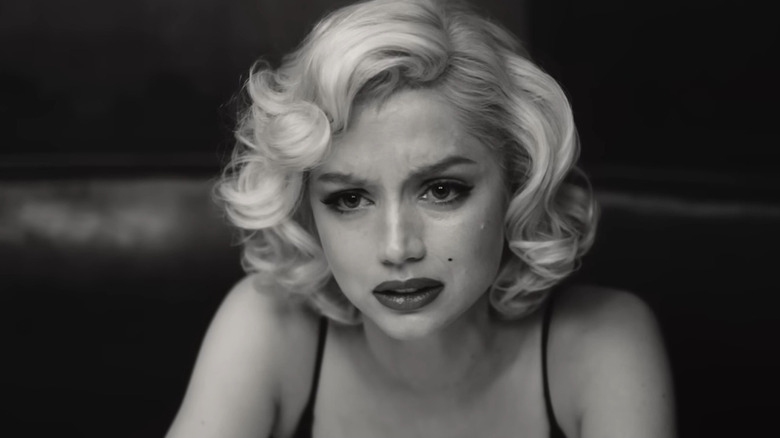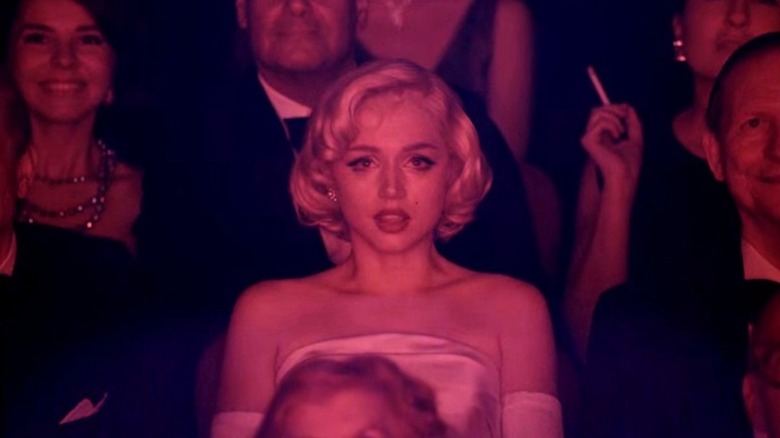Andrew Dominik Explains His Choice For Marilyn Monroe's Fate In Blonde
Andrew Dominik's "Blonde" is easily the most controversial film of the fall. Based on Joyce Carol Oates' fictionalized account of Marilyn Monroe's brutally tragic life, Dominik leans way more into the brutality than the tragedy. For close to three hours, he treats his glamorous subject like a corpse on a slab; alas, he proves a poor coroner because, from frame one, it feels as though he's made up his mind as to the cause of death. His Monroe is born a victim. She is used and abused unceasingly throughout her life. Worse, she is helplessly complicit in her own victimization.
This doesn't sync up with the Monroe presented by her many biographers, but Dominik is not bound to the historical record. While there's nothing wrong with playing fast and loose with the facts to get at a deeper truth about a person or, as Oates attempted, American society's double-edged worship/debasement of beautiful women, you need to evoke some kind of empathy for the person being destroyed. Ana de Armas exudes as much of her natural charm as Dominik will permit to draw us in, but she's limited to one miserable note. Dominik trots out various visual flourishes and formats to juice the drama (the film is, if nothing else, a formal marvel), but you're reminded at every moment that Monroe is doomed. After an hour or so, you just want Dominik to put her down like a terminally ill pet.
And yet when the end finally arrives, Dominik lacks the nerve to complicate Oates' thesis. It's hard to say what's more frustrating, the method of Monroe's demise or the filmmaker's defense of its portrayal.
A depressing end to a miserable life
In Oates' book, it's insinuated that Monroe's most powerful paramour, President John F. Kennedy, might've played a role in her death. In an interview with The Wrap, Dominik said he had no intention to entertain this theory.
"I don't believe that she was murdered. It doesn't make any f–ing sense. There is no reason to murder her, because if she'd held a press conference and said that she'd had affairs with the Kennedys, no one would have reported it. I mean she could have literally called a press conference, and no one would have written down what she said. So it makes no sense to kill her."
Dominik went on to explain that he believes she died of an accidental overdose, which in his opinion is essentially suicide. "I think that she's essentially a self-destructive person," he said. "I don't think anyone can disagree with that, that she was an intensely self-destructive person. She was an addict, you know?"
A shell of a savvy starlet
The problem with Dominik's ending isn't its absence of intrigue, but, rather, its utter lack of compassion. For two-and-a-half hours, we've observed the desecration of one of the most beloved, yet enigmatic movie stars of the 20th century. Through it all, de Armas' Monroe evinces not only zero agency, but little interest in pulling out of her lifelong downward spiral. Actually, it's worse than that. She doesn't even possess the intellectual capacity to fight back.
This is why "Blonde" is so maddening. By downplaying Monroe's business savvy in order to emphasize her relentless victimization, Dominik flattens the essential, tragic arc of her life. Monroe wasn't the ditz she often portrayed in movies. She was a remarkably gifted comedic performer who harbored ambitious plans to capitalize on her brand. She was a smart woman who understood the game, and desired so very much to vanquish her demons. Monroe was, in the end, a victim, but she didn't take it literally lying down as Dominik's film asserts. She wasn't a cliché. We wouldn't still be enchanted by her 60 years after her death had that been the sum total of her person.


